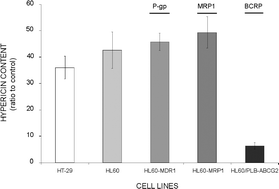Drug efflux transporters, MRP1 and BCRP, affect the outcome of hypericin-mediated photodynamic therapy in HT-29 adenocarcinoma cells
Abstract
Photodynamic therapy (PDT) is a flexible multi-target therapeutic approach. One of the main requirements of successful PDT is sufficient intracellular concentration of an applicable photosensitizer. Mechanisms of anticancer drug elimination by tumour cells are mostly linked to the elevated expression and activity of P-glycoprotein (P-gp), multidrug resistance-associated protein 1 (MRP1), breast cancer resistance protein (BCRP) and P450 monooxygenases. The interaction of hypericin with this cell drug-defence system is still unclear. We report here for the first time increased activity of MRP1 and BCRP in HT-29 colon cancer cells treated with hypericin per se. On the contrary, pre-treatment with proadifen (SKF525A) affected the function of MRP1 and BCRP leading to increased hypericin content, which might indicate a possible link between proadifen and these ABC transporter proteins. Subsequent enhanced intracellular oxidative stress was accompanied by loss of mitochondrial membrane potential, activation of caspase-9 and -3, PARP cleavage and onset of apoptosis. In conclusion, our study suggests that drug efflux transporters MRP1 and BCRP affect the pharmacokinetics of hypericin in HT-29 colon adenocarcinoma cells, and the action of hypericin-mediated PDT (HY-PDT) should be modulated by pre-treatment with their specific inhibitors.


 Please wait while we load your content...
Please wait while we load your content...